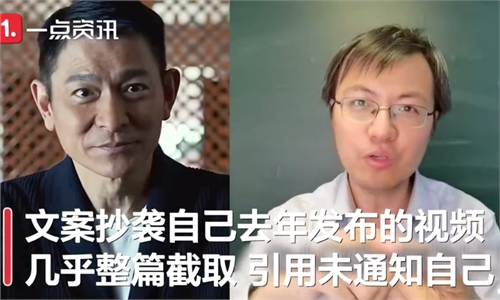The intense public outcry and discussion on Chinese social media over FAW-Volkswagen Audi’s ad plagiarism controversy underscores growing public awareness of intellectual property rights (IPR) in China in recent years, thanks to a confluence of factors, including China’s robust efforts to protect IPR, the leapfrog in Chinese firms’ innovation capabilities and increasingly mature Chinese consumers, analysts noted.
FAW-Volkswagen Audi, German carmaker Audi’s Chinese joint-venture, apologized on Sunday after one of its new video ad on Chinese social media featuring Hong Kong star Andy Lau was accused of copying from a Douyin influencer. Audi removed the video and urged London-based ad agency M&C Saatchi, which produced the video content, to investigate and deal with the incident.
M&C Saatchi apologized on Sunday, saying that its Audi team “lacks copyright awareness.” Lau also issued an apology and said he has 100 percent respect for originality.
The incident instantly aroused discussion and concern among official media and netizens about patent and copyright protection in China, with many people urging tougher punishment for this kind of infringement to “give justice back” to original content creators.
Although Audi and others involved in the incident had apologized on Sunday over the issue, Chinese consumers will not easily turn the page, given the rising public awareness of and maturing legal safeguards for protecting IPR, experts said.
From a legal perspective, Audi is suspected of copyright infringement by using the text from the original author's video without authorization, Zhao Zhanling, a research fellow at the Center for IPR Studies at China University of Political Science and Law, told the Global Times.
“Protecting original content is protecting innovation. Plagiarism is an industry scandal, and possible violation of the law, and should be treated with zero tolerance. The incident should not end with an apology, but it should also become an opportunity for industry reflection on how to build an effective mechanism to prevent this kind of event,” read an article published by the People’s Daily on Sunday.
The heated discussion underscored an increasing awareness of IPR among the public, Zhao said.
“In China, all companies, including foreign and domestic ones, are all required to abide by the laws related to intellectual property rights,” Zhao said.
Experts said the Audi case is also a reflection of Chinese content creators’ rising awareness of IPR protection, as more and more Chinese companies are using legal tools to safeguard their IPR in cases where large overseas companies are involved.
According to the State Intellectual Property Office, there were about 28,000 first trials of patent lawsuits in 2020, up 28 percent compared with the previous year. Legal cases involving copyrights and trademarks also increased.
Many of the cases were suits by Chinese companies against overseas firms, some of which are famous multinational giants.
A Shanghai tech company sued Apple in the Shanghai High People’s Court in 2021 over patent infringement of Siri voice dialogue services. It asked Apple to stop patent infringement involving Siri, and to stop producing and selling iPhone products involving patent infringement.
Prior to that, the company sued Apple in August 2020, asking for compensation of 10 billion yuan ($1.49 billion) from the US mobile phone giant over patent disputes.
In another IPR dispute between Japanese clothing brand Muji and a Beijing company named Beijing Cotton Field Textile Co, a Beijing court recently ruled in favor of Beijing Cotton Field, and asked Muji and its Shanghai subsidiary to pay about 400,000 yuan for trademark infringement.
According to Zhao, the rising IPR lawsuits show that many enterprises in China and Chinese brands are getting stronger in the international market with more patents in their hands and market competitiveness, Zhao said.
“Therefore, it isn’t rare for Chinese enterprises to sue foreign enterprises for infringement. On the other hand, relevant laws are improving in China,” Zhao said.
Global Times

